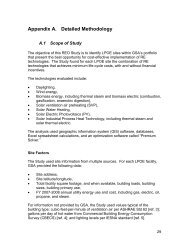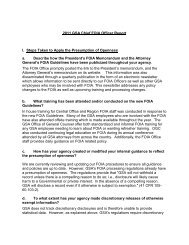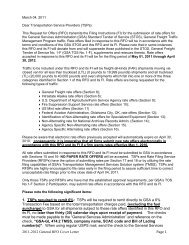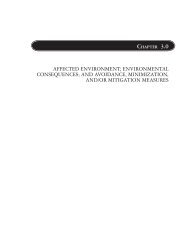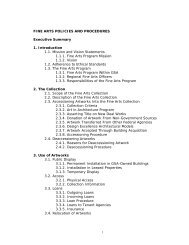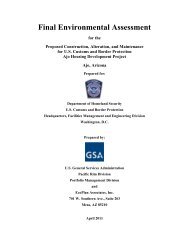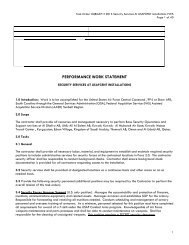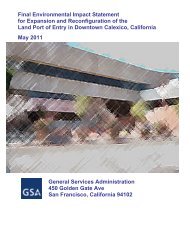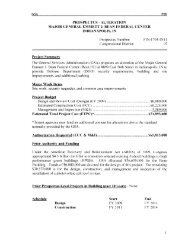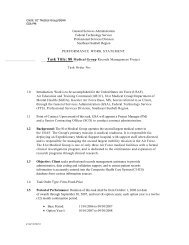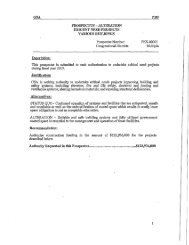Sustainable Development and Society - GSA
Sustainable Development and Society - GSA
Sustainable Development and Society - GSA
Create successful ePaper yourself
Turn your PDF publications into a flip-book with our unique Google optimized e-Paper software.
<strong>Sustainable</strong> <strong>Development</strong> <strong>and</strong> <strong>Society</strong><br />
Environmentally<br />
Preferable Purchasing:<br />
The Progress <strong>and</strong> Remaining Challenges<br />
of Multi-Attribute Decisionmaking<br />
By Alison Kinn-Bennett<br />
Alison Kinn-Bennett is the Model Green Construction Specifications Project Officer,<br />
for the US Environmental Protection Agency, Environmentally Preferable Purchasing<br />
Program in Washington, DC.<br />
Consumers can play an integral role in<br />
improving environmental <strong>and</strong> public<br />
health through their purchasing<br />
patterns. By dem<strong>and</strong>ing certain attributes,<br />
consumers can send a clear signal to<br />
manufacturers about their preferences for<br />
those products <strong>and</strong> services that pose<br />
fewer burdens on the environment. By<br />
leveraging their purchasing power,<br />
consumers are voting with their<br />
pocketbooks, directly affecting<br />
manufacturers’ bottom lines. Some<br />
manufacturers are attuned to this market<br />
signal <strong>and</strong> have recognized that<br />
differentiating their products on the basis of<br />
environmental attributes can serve as a<br />
competitive advantage.<br />
As the single largest consumer of goods<br />
<strong>and</strong> services, spending over $250 billion<br />
annually on a wide variety <strong>and</strong> large<br />
quantity of products <strong>and</strong> services, the U.S.<br />
Federal government leaves a large<br />
environmental footprint. By the same<br />
token, it can wield its purchasing power to<br />
propel companies to manufacture products<br />
<strong>and</strong> services that pose fewer burdens on<br />
the environment <strong>and</strong> thereby leverage <strong>and</strong><br />
jump-start the market for “green” products<br />
in both the public <strong>and</strong> private sectors. 1 In<br />
The Benefits of Environmentally<br />
Preferable Purchasing<br />
• Improved ability to meet environmental goals<br />
through markets rather than m<strong>and</strong>ates<br />
• Improved worker safety <strong>and</strong> health<br />
• Reduced liabilities<br />
• Reduced disposal costs<br />
the environmental arena, the fact that paper<br />
with recovered materials content has<br />
become the norm is an example of how<br />
purchases of such goods by the Federal<br />
government made them more widely<br />
acceptable <strong>and</strong> available.<br />
However, despite this potential, the<br />
Government has not relied heavily on<br />
dem<strong>and</strong>-driven policies to achieve<br />
environmental improvement, <strong>and</strong> the<br />
market for “green” products remains a<br />
niche market in many sectors. Why? In<br />
part, this is because there currently is no<br />
existing infrastructure that can easily<br />
facilitate the identification of “green”<br />
products <strong>and</strong> services for American<br />
consumers. Although there are a number of<br />
private sector environmental labeling or<br />
57




